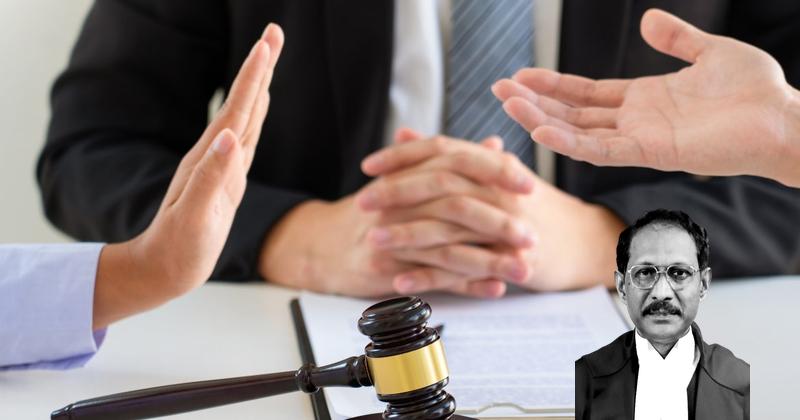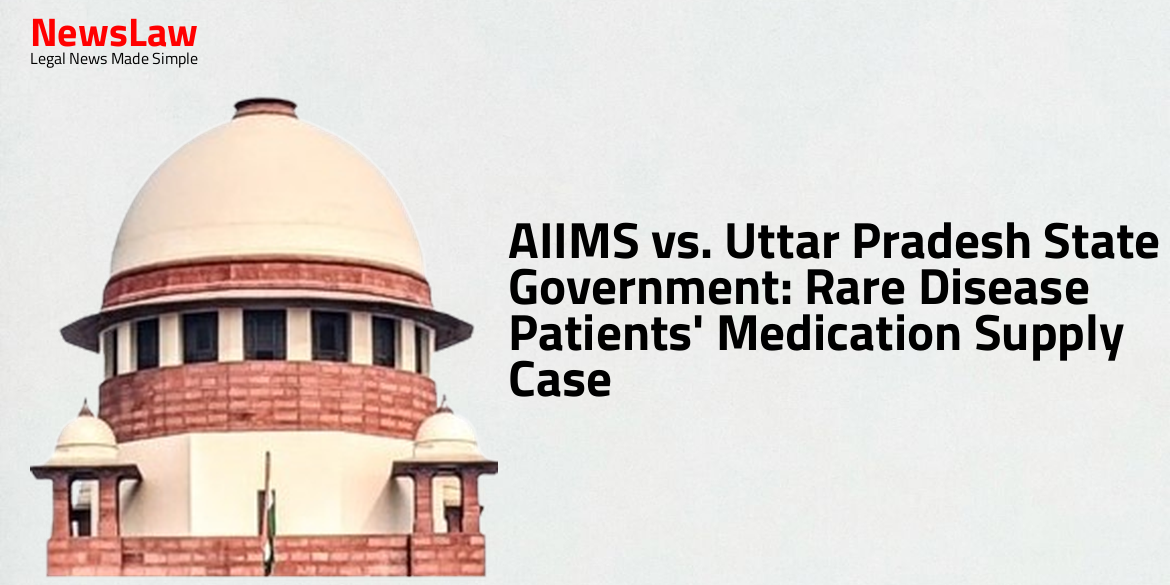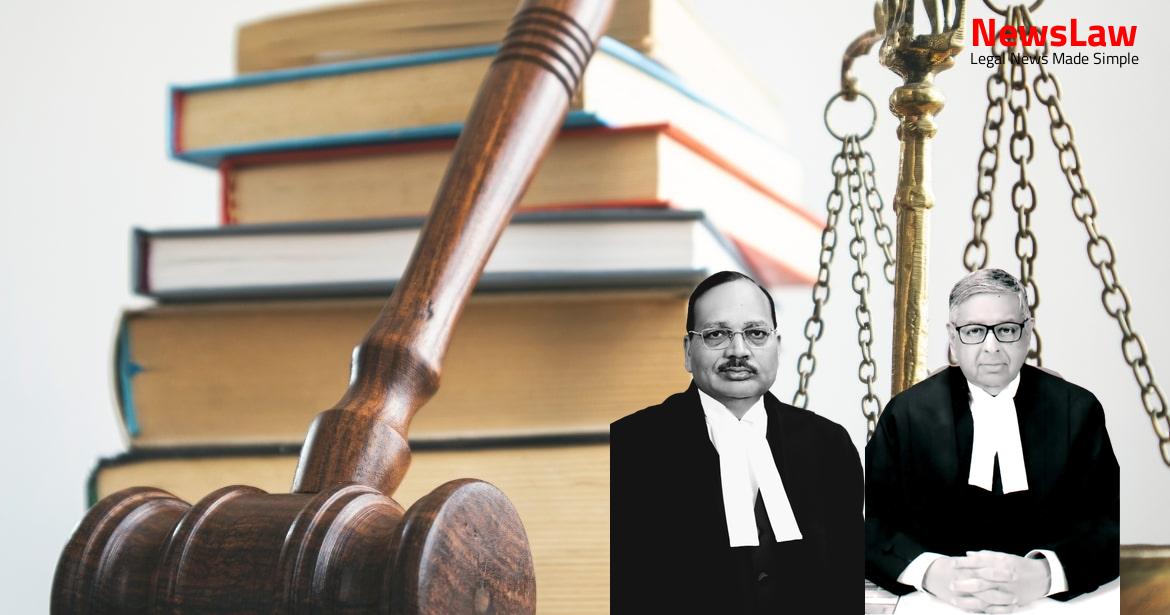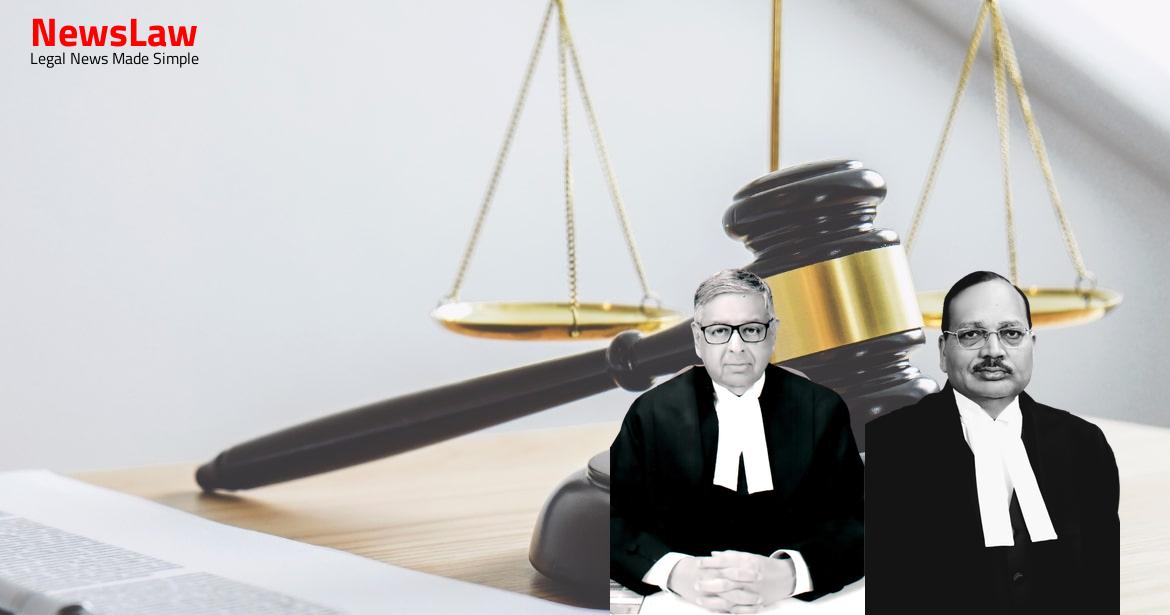During the pendency of the captioned appeal, the second appellant died and consequently his legal heirs were impleaded as additional appellants 2.1 to 2.4. Subsequently, the plaintiff / respondent herein got amended the plaint by adding paragraph 9 (a), schedules A, B and ‘C’ and also prayers qua them viz., prayer ‘b’.
(b) A judgment and decree against the defendants for mandatory injunction directing the defendants to restore the possession of the ‘B’ schedule property, which is marked ‘ABCD’ in the annexed sketch, and there may be decree for permanent injunction against the defendants for ‘CDEF’ portion which is marked as ‘C’ schedule to the plaint and there may be a decree for the enquiry into the mesne profits with Order XVIII Rule 12 of CPC, and also there may be a decree for the cost of the suit, with such other relief or reliefs as this Hon’ble Court deems fit in the circumstances of the case. :
The Trial Court, after considering the evidence and the provisions of law applicable partly decreed the suit as per judgment dated 04.07.2007, holding that the plaintiff/respondent herein, is entitled to recover possession of suit ‘B’ schedule property from the defendants and consequently directed the defendants to vacate and deliver suit ‘B’ schedule property to the plaintiff (the respondent herein) within two months from that day. Further, it was also decreed that the plaintiff would be entitled to recover possession of ‘B’ schedule property from the defendants by due process of law in case of failure on the part of the defendants to vacate and deliver the suit ‘B’ schedule property within the period stipulated. The said judgment of the High Court dated 29.10.2007 was challenged by the plaintiff/respondent herein before this Court in SLP (Civil) No.1279 of 2008 essentially, contending that the said suit being one filed under Section 6 of the Specific Relief Act, the appeal filed before the High Court being RFA No.1966 of 2007 was incompetent. While, virtually, remanding the matter thereunder to the High Court for fresh disposal of the appeal the trial Court was directed to record the evidence as directed by the High Court and to submit a report thereon to the High Court to enable it to dispose of the appeal within the time stipulated. Thus, it is evident that the direction to the trial Court for recording the evidence and submitting it along with report will not efface the evidence already on record or will not be having the effect of setting aside of the judgment and decree passed by the trial Court and indisputably, its purpose was only to enable the High Court to consider RFA No.1996 of 2007 carrying challenge against the judgment and decree of the trial Court in O.S. Besides the same, three more applications were filed before the Trial Court viz., (1) seeking permission to file additional written statement; (2) seeking permission to produce 8 documents; and (3) to recall PW-1.
Pursuant to this Court’s order dated 03.08.2009 the Trial Court took up the matter and posted it for the evidence of the defendants. Civil No.11451/2010 filed under 41 Rule 2 r/w Section 151 of the Code of Civil Procedure by the appellants to raise additional grounds in this appeal as ground No l6C & 16D is to be allowed or dismissed?” On the question whether the suit is bad for non-joinder of necessary parties viz.
That apart, it is contended that the High Court had failed to consider the contention that the subject suit was actually abated owing to the failure of the respondent herein/the plaintiff to bring on record the legal representatives of Sri Hanumaiah, the third respondent who breathed his last during the pendency of the subject suit.
The avowed purpose of the proposed amendment was obviously to bring in the contention that the suit property was purchased by the deceased second appellant from Sriman Madhwa Sangha and Sri Vittal Rao as per sale deed dated 05.10.2000. The said appeal came to be disposed of by the High Court as per judgment and decree dated 29.10.2007, whereunder the said application was allowed and the appellants therein/the original defendants 1 and 2, were given permission to lead additional evidence before the Trial Court. It is aggrieved by the said judgment and decree dated 29.10.2007 of the High Court that the respondent herein/the plaintiff filed a Civil Appeal No.5201 of 2009 arising out of SLP (C) No.1279 of 2008 before this Court and which came to be disposed of modifying the judgment and decree of the High Court dated 29.10.2007 by directing the Trial Court to record the evidence ‘as directed by the High Court’ and transmit the records to the First Appellate Court viz., the High Court and such other directions as mentioned hereinbefore.
Also Read: https://newslaw.in/case-type/criminal/suppression-of-material-facts-and-fraud-on-the-court/
But at the same time, we should keep reminded of the position that the same cannot be granted on the mere request through an application for amendment of the written statement, especially at the appellate stage, where, what is called in question is the judgment and decree passed by the trial Court and, in other words, after the adverse decree and without a genuine, sustainable reason. Indisputably, thereafter, during the span of one year or thereabouts more than eight opportunities were given to the defendants therein to file additional written statement, if any. The materials on record and the impugned judgment passed by the High Court would reveal that the original defendants 1 and 2, who were the appellants before the High Court raised various contentions in support of their prayers for amendment of the written statement as also for permission to raise additional grounds in the appeal, before the High Court and they were also reiterated before us. 15.04.1997, that in the interlocutory application filed in RFA No.1966 of 2007 based on which the trial Court was directed to afford opportunity to the defendants to adduce evidence as per judgment and decree passed on 29.10.2007 they sought permission only to adduce evidence, contending that they were deprived of opportunity to adduce evidence and even at that point of time no permission was sought for amending the written statement, were taken into consideration by the High Court. The fact is that the defendants had pleaded that the ownership of the suit property was with the said third parties and did not claim possession specifically and it is thereafter that they sought to bring in a plea that pursuant to an agreement for sale entered into between those parties viz., the first defendant/the first appellant herein viz., Exhibit D-1 dated 01.03.1993 possession of the suit schedule property was delivered to the first appellant. But the crucial reason assigned by the High Court to dispel them is that the first defendant/the first appellant herein did not enter the box and the deceased second defendant/the second defendant while being examined as DW-1, during his chief examination itself admitted that the respondent herein/the plaintiff was then in possession of the suit schedule ‘A’ property (which also includes ‘B’ schedule) viz., in and vide paragraph 8 of his affidavit filed in lieu of chief examination. Since admittedly and indisputably the suit from which the appeal arises was one based on possessory title, the legality of Exhibit D-2 sale deed need not be gone into in this appeal and rightly has not been gone into by the High Court.
Transfer of possession pendente lite will also be transfer of property within the meaning of Section 52 and, therefore, the import of Section 52 of the TP Act is that if there is any transfer of right in immovable property during the pendency of a suit such transfer will be non est in the eye of law if it will adversely affect the interest of the other party to the suit in the property concerned. We referred to the aforesaid aspects solely to drive home the point that since the subject suit is based only on possessory title viz., on the basis of prior possession the finding and consequential rejection of the prayer for amendment of written statement to bring in the plea of purchase of the property pending the suit by the deceased second appellant cannot be said to be ground resulting in grave injustice. It is a fact that the defendants filed an application for amendment of the written statement before the trial Court when the matter was sent to the trial Court pursuant to the order of this Court in CA No 5201 of 2009 for recording the evidence solely for the purpose of forwarding the same along with a report to the High Court to enable the High Court to dispose of RFA No 1966 of 2007. Naturally one of the circumstances which will be taken into consideration before an amendment is granted is the delay in making the application seeking such amendment and, if made at the appellate stage, the reason why it was not sought in the trial court.
But, there is no prohibition against an appellate court permitting an amendment at the appellate stage merely because the necessary material is not already before the court.” After quoting the same it was observed in Gayathri Women’s Welfare Association’s case (supra) thus: – “These observations clearly indicate that one of the circumstances which will be taken into consideration before an amendment is granted is the delay in making the application seeking such amendment and, if made at the appellate sage, the reason why it was not sought in the trial court.” It is to be noted that in the case on hand also as stated earlier, there was considerable delay in seeking amendment of the written statement or filing additional written statement and no sustainable reason was assigned as to why such prayers were not sought in the trial court while the original proceedings were pending before it. It is also relevant to note that such prayers were also not made before the High Court when the High Court initially disposed of RFA No 1966 of 2007 as per judgment dated 29.10.2007 and also before this Court in CA No 5201 of 2009 directed against the said judgment.
But, it is now well settled that an order of remand by the appellate court to the trial court which had disposed of the suit revives the suit in full except as to matters, if any, decided finally by the appellate court. As per the same, the scope of proceedings before the trial Court was confined only to record the additional evidence of defendants and to transmit the same to the High Court so as to enable the High Court to dispose of RFA No.1996 of 2007 afresh.
There was, therefore, no jurisdiction in the learned trial Judge to allow an amendment of the pleadings which was outside the scope of the remand order.” In totality of the circumstances, especially taking into account the relevant reasons assigned by the High Court for disallowing the prayer for amendment of the written statement and taking note of the delay and the failure to offer any reason therefor and the reasons mentioned hereinbefore we see no reason at all to hold any perversity or illegality with the rejection of the prayer for amendment of the written statement.
No 5201 of 2009 this court held against the respondent herein/ the plaintiff that the suit is not one under Section 6 of the Specific Relief Act. But we are entirely in agreement with the High Court that the question whether the suit is one under Section 6 of the Specific Relief Act is not now available for consideration as it was held otherwise by this court in the judgment in C.A. It is also a fact that after carefully scanning the pleadings and evidence of the defendants, the High Court, as per the impugned judgment, held that what is raised by the defendants to resist the case of the plaintiff / the respondent herein is nothing but a plea that attracts the principle of “jus tertii”, which in Latin means ‘right of a third party.’
Obviously, to buttress their contention that the suit is maintainable, based on the contention of the defendants that the right of possession is outstanding in some third person that attract the principal of ‘jus tertii’ and that they, therefore, are not justified in challenging the maintainability of the suit the defendant relied upon the decision of this Court in Krishna Ram Mahale (Dead), By LRs v. In the said decision, this Court held that it could not be said that after a period of six months is over, a suit based on prior possession alone, is not possible and it in so far as relevant reads thus: – “15. Santha Pillai, with agreement: – “…..that a party ousted by a person who has no better right is, with reference to the person so ousting, entitled to recover by virtue of the possession he had held before the ouster even though that “possession was without any title.” In view of the aforesaid decisions and the factual position obtained in this case, in our opinion, the decisions sought to be relied on by the appellants are really of no assistance. Now, we will consider the question whether the suit ought to have been held as abated against all the defendants as contended by the appellants for non- substitution and owing to the failure to implead all the legal representatives on the death of the original third defendant- Hanumaiah. While considering the same, the fact that the aforesaid Sriman Madhwa Sangha and Sri Vittal Rao filed a petition for eviction against the respondent herein as HRC No.10020 of 1991 wherein it was stated that the first respondent therein (the respondent herein) is in occupation of a portion of the schedule property and he has illegally and unauthorizedly sub-let the other two portions of the property to the second and third respondents therein, namely Shri B. That apart, the fact that while being examined as DW-1 the deceased second appellant herein had deposed that no possession was taken after execution of Exhibit D-1 agreement for sale dated 01.03.1993 as Sriman Madhwa Sangha had assured to secure possession and hand over the possession to the first appellant herein/the first defendant. Upon the death of original third defendant viz., Hanumaiah the original defendants No.1 and 2, who are sons of the original defendant No.3 fully and substantially representing the joint interest contested the suit and, thereafter, after suffering an adverse judgment and decree in the suit diligently preferred the appeal before the High Court which ultimately culminated in the impugned judgment and decree. If the appellant would not have filed any application to bring on record the daughters and the widow of the deceased the appeal would not have abated under Order 22 Rule 4 of the Code of Civil Procedure as held by this Court in Mahabir Prasad v. We, therefore, do not find any reason to agree with the submission made by the learned counsel appearing for the appellants.” We are of the considered view that the same analogy is applicable in a case where even in the event of death of one of the defendants, when the estate/interest was being fully and substantially represented in the suit jointly by the other defendants along with deceased defendant and when they are also his legal representatives.
Upon the death of the second appellant the joint interest is being fully and substantially taken forward in this proceeding as well by the first appellant along with the substituted legal representatives of the deceased second appellant, we do not find any reason to disagree with the conclusions and findings of the courts below for rejecting the contention that suit ought to have held abated owing to the non- substitution of all the legal heirs of deceased third defendant against all defendants.
Case Title: SHIVSHANKARA Vs. H.P.VEDAVYASA CHAR (2023 INSC 318)
Case Number: C.A. No.-010215-010215 / 2011



